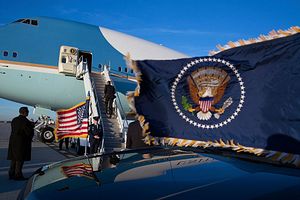President Barack Obama leaves today for a tour of Asia, with stops in Japan, South Korea, Malaysia, and the Philippines. The trip is Obama’s first to Asia since 2012 — a planned visit to Southeast Asia in the fall of 2013 was cancelled due to the government shutdown in Washington. While Obama will not be visiting China, the trip could have major implications for U.S.-China relations. As former U.S. Defense Secretary Robert Gates said in his memoir, “On any trip to Asia, even if China isn’t on the itinerary, it is on the agenda.” Beijing will certainly be watching the tour with great interest, trying to gauge U.S. commitment to and intentions for the Asia-Pacific region.
During U.S. Secretary of Defense Chuck Hagel’s recent trip to China, Chinese officials made it abundantly clear that they pay close attention to comments made to other Asian officials. Before arriving in Beijing, Hagel met with ASEAN Defense Ministers in Hawaii and visited Tokyo. In both instances, he emphasized the U.S. commitment to military engagement in the region, and spoke of the need for respecting the status quo when it comes to territorial disputes. These speeches did not sit well in Beijing. General Fan Changlong was unusually blunt in telling Hagel that “the Chinese people, including myself, are dissatisfied with such remarks.”
Still, despite China’s complaints, Obama will doubtless echo Hagel’s comments during his own trip to Asia. Both Japan and the Philippines are embroiled in tense territorial disputes with China, and U.S. officials have already made it a habit to express their displeasure at China’s actions in those regions (though they generally avoid calling China out by name). Look for Obama to repeat such remarks while in Tokyo and Manila, where he will doubtless also reiterate the U.S. defense commitments to its allies. Going beyond the normal rhetoric, Obama is expected to formally sign a deal allowing U.S. troops to share military bases in the Philippines, providing a concrete illustration of the rebalance to Asia. Obama may also use his stop in South Korea to publicly pressure China for more action on the North Korea nuclear issue, which is expected to be a major topic of discussion between Obama and South Korean leaders.
China is already preparing itself for a flood of implicit or explicit barbs from the U.S. President. An op-ed by Peking University professor Liang Yunxiang in Global Times noted, “Three of the destinations for Obama’s Asia visit are Washington’s allies. There is no doubt that a certain part of their talks will be directed at China.” In fact, Liang added, none of the topics likely to be discussed during the trip can be separated from concerns over China’s rise and the resulting U.S. rebalance.
An article in People’s Daily [Chinese] asked whether Obama would act as a “firefighter or provocateur” in Asia. This article repeated the Chinese position that Japan and the Philippines are to blame for increased tensions in the East and South China Seas, and accused the U.S. of being “irresponsible” for not appropriately chastising its allies. The article rejected U.S. claims that it is neutral in the territorial disputes, and accused the U.S. of “supporting and encouraging” the provocative actions of Tokyo and Manila. “These irresponsible comments and actions obviously run counter to [the United States’ stated goal of] protecting peace and stability in the Asia-Pacific region,” the article said.
China has been wary of the U.S. “pivot to Asia” since before it even had a name. Beijing believes that an increased U.S. presence in Asia is, at best, designed to counter China’s rise — and, at worst, designed explicitly to “contain” China and prevent it from rising. Recent comments by U.S. officials, especially those made alongside U.S. allies like Japan and the Philippines, have only exacerbated China’s concerns.
Harry Kazianis has dubbed Hagel’s recent visit to Asia and Obama’s upcoming trip “the great reassurance tour.” For China, both trips are anything but reassuring. From Beijing’s point of view, it seems more and more obvious that the rebalance to Asia is only a front for a full-on diplomatic attack on China. Expect Obama’s tour of Asia to solidify this perception. After all, unlike Hagel, Obama will not even be making a cursory stop in China to attempt to explain the comments he made in other capitals.
































